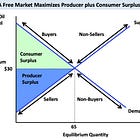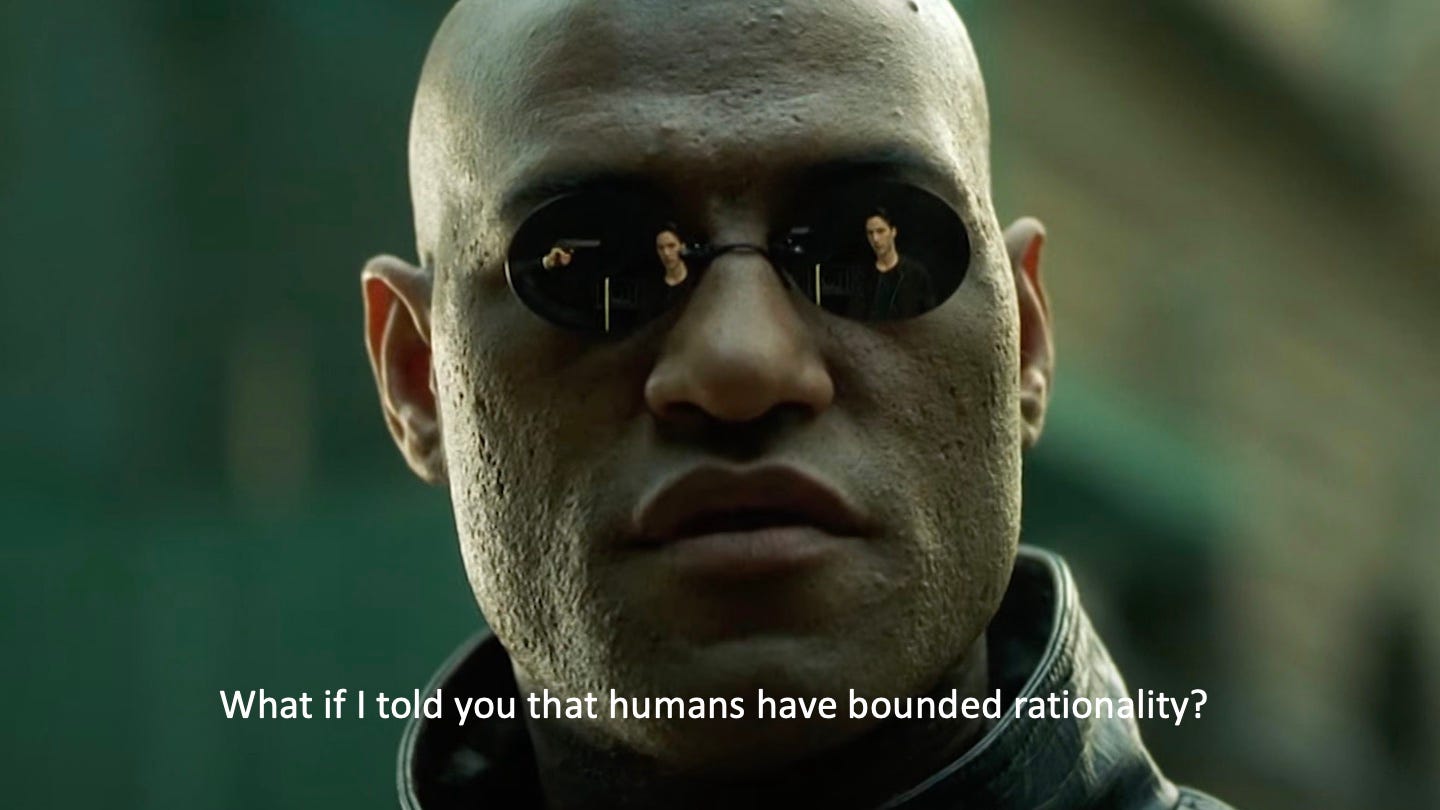Markets as Error Correction Processes
Error correction helps us adapt to change and create value
I have several themes planned for this Substack, one being the underappreciated beneficial aspects of markets. That’s why I’ve written about how markets adapt to changing conditions better than alternative institutional frameworks, what makes a market a market, the knowledge problem and institutions, and how markets are knowledge ecosystems.
Think about the economics that most of us learn in school. Usually it’s market supply and demand right out of the gate, building on Lionel Robbins’ definition of economics as the study of the allocation of scare resources across virtually unlimited wants. While concise and accurate as far as it goes, it narrows the scope of the narrative and analysis to a static allocation problem. In “The Use of Knowledge in Society,” (1945), Hayek critiqued his friend’s static definition and its limitations by arguing that the true fundamental economic problem is the coordination of actions and plans across people who have their own subjective preferences and opportunity costs, knowledge that is known only to them and only in the context of facing a choice (I also discussed this idea in the two knowledge posts linked above). Hayek’s broader point demonstrates that market institutions allow for the expression of some of that knowledge, which is then reflected in the market-clearing prices that emerge out of that dynamic decentralized coordination process. “Solving” the static allocation problem through informative, emergent prices is one of many dimensions of this fundamental economic problem, but in the economics that most people learn, it's the starting point but the logic and the scope do not progress much beyond there.
This static understanding of using markets and prices to “solve” resource allocation problems derives from the basic models of neoclassical economics, in which people are individual agents that face tradeoffs and make choices while possessing full information, so they can weigh those tradeoffs frictionlessly. They frictionlessly find the market-clearing price, generating welfare in the process as consumer and producer surplus. This static theory gives us the competitive benchmark that we use to evaluate the welfare losses associated with deviations and interventions such as taxes and subsidies. It also assumes away, as Coase would say, the institutional structure of production, the role of institutions in shaping how we organize economic activity. In the spirit of “all models are wrong but some are useful” this static, institutionless model is useful, as far as it goes.
Once you move beyond those basic neoclassical models you get some dynamics by introducing time as a component of choice – consume now or save for later, invest now to produce later, incur costs now to reap benefits later (or vice versa). That’s why dynamic thinking in economics usually involves some kind of discounting of future benefits and costs to make them comparable to current benefits and costs, and a consideration of interest rates as the opportunity cost of a resource over time. But even that injection of dynamics still yields theory grounded in strong assumptions, such as people knowing fully the discount rate or interest rate and having perfect foresight to be capable of implementing a first-best welfare maximizing outcome.
But that still doesn’t address fully some of the most fundamental realities of being human that get assumed away, despite 40 years of considerable work in economics to relax these assumptions of full information, perfect foresight, and institutional sterility. Over this time period behavioral economics has developed, and has been noted/notorious for characterizing deviations from “perfect” equilibria as “anomalies”. What if they aren't anomalies? What if that's just ... how we are?
In 1955-1957 Herbert Simon famously developed and formalized the idea of bounded rationality, [this Stanford Encyclopedia of Philosophy article is thorough and excellent -LK] “... his call to replace the perfect rationality assumptions of homo economicus with a conception of rationality tailored to cognitively limited agents.” Humans do not have logical or temporal omniscience; we are cognitively constrained beings, and we should take those constraints into account when developing economic theory and applying it to the actual social institutions that emerge and that we design (and the intersection of emergence and design). Yes, we should model people as rational maximizing agents, but the concept of rationality is one of ecological rationality (pioneered by Gerd Gigerenzer and developed in experimental economics by Vernon Smith), where people make what they see as the best choices available to them given their situation, their environment, and their perception of tradeoffs and opportunity costs.
Part of the environment in which people make choices is the social institutional framework, such as markets. In addition to being processes of dynamic decentralized coordination and knowledge ecosystems, markets are processes of error correction. Through individual actors seeking their own best interests (understood as ecologically rational), markets tend to move towards more value-creating resource allocation (static) and plan coordination (dynamic) outcomes. This happens through price and other signals that incentivize adjustments when people perceive errors and take actions based on that perception. Errors typically take the form of misjudgments, inefficiencies, or incorrect valuations related to various factors like demand, supply, production costs, or new information. Price signals, the nervous system of the knowledge ecosystem, reflect individual valuations for goods and services. When there's an error, such as an undervalued resource, its price will tend to rise as more buyers compete for it. This feedback effect is the basis for error correction.
Financial markets are the places that this error correction dynamic is most evident – traders decide to buy or sell a stock based on their assessment of the company's value and the actions the company is expected to take, within the broader economic environment that can, and will, lead to changing conditions. As those changes occur, traders reevaluate their valuations and buy or sell accordingly. If something surprising happens, like Microsoft’s announcement yesterday of strong financials but a higher than expected future expenditure on AI, traders may see their current positions as a mistake and change them. What we think is true ex ante may not be true ex post, as change happens, and having a social institution that enables us to correct errors as we go is an essential aspect of our beneficial adaptation to change. This process is certainly not perfect, as financial market bubbles and bandwagon effects demonstrate, but financial markets generally have rules and structures that attenuate those positive feedback effects and reinforce the interactions of participants in a negative feedback look that is equilibrating.
Economist Israel Kirzner calls this perception of errors entrepreneurial alertness. He argued that entrepreneurs, by identifying and acting on errors in market prices or information, contribute to the discovery and correction of these errors. His 1997 Journal of Economic Literature literature review on the Austrian approach to entrepreneurial discovery and the competitive market process is a useful overview of this concept of entrepreneurial discovery creating value through error correction.
In particular this approach (a) sees equilibration as a systematic process in which market participants acquire more and more accurate and complete mutual knowledge of potential demand and supply attitudes, and (b) sees the driving force behind this systematic process in what will be described below as entrepreneurial discovery. ... For the Austrian approach imperfect information is seen as involving an element which cannot be fitted at all into neoclassical models, that of ‘sheer’ (i.e., unknown) ignorance. ... Entrepreneurial discovery is seen as gradually but systematically pushing back the boundaries of sheer ignorance, in this way increasing mutual awareness among market participants and thus, in turn, driving prices, output and input quantities and qualities, toward the values consistent with equilibrium (seen as the complete absence of sheer ignorance). (1997, p. 62)
If we combine Kirzner’s concept of entrepreneurial discovery in the presence of sheer ignorance with bounded and ecological rationality, that’s a pretty solid picture of how markets serve as error correction processes. My purpose here is not to delve into Kirzner’s nuanced theory of entrepreneurial discovery and his characterization of sheer ignorance, so please don't read that into my claim, which is simply that as cognitively constrained beings, humans derive substantial benefits from the ways that markets enable them to adapt to changing conditions and act on their perceptions of errors.
Another underappreciated economist, Don Lavoie, championed the view of markets as dynamic, self-correcting processes (his 1985 book, rereleased in 2015, Rivalry and Central Planning is an absolutely essential read). He envisioned prices as “information-carrying signals” that resonate throughout the market ecosystem. When inefficiencies or errors arise, like a scarce resource being undervalued, these signals become amplified. Producers, attuned to this price information, adjust their behavior. They might ramp up production or adopt more efficient methods, aiming to capitalize on the newfound opportunity. Simultaneously, consumers, responding to price changes, might shift their buying habits, seeking substitutes or adjusting their consumption patterns. These individual adjustments, guided by prices, induce the market to evolve toward more value-creating outcomes. Through this ongoing dialogue between people and prices, Lavoie argued, markets discover and correct errors. This process isn’t instantaneous or perfect, but both Kirzner’s and Lavoie’s works shed light on the inherent error-correcting potential of markets.
Markets are important, valuable social processes. They help us coordinate resource use and plans, even among far-flung strangers. They help us adapt to changing conditions. They help us overcome our cognitive constraints. Of course they aren't perfect, but by combining adaptation, decentralized coordination, knowledge ecosystems, and error correction, they enable us to achieve more and flourish more compared to alternative social institutional frameworks that are more brittle, less adaptable, and less capable of enabling us to benefit from correcting errors.






As David Deutsch points out, error correction is the basis of morality in a society. Without it you end up like North Korea.
Wonderful article, I loved it and learn a lot. Thanks!